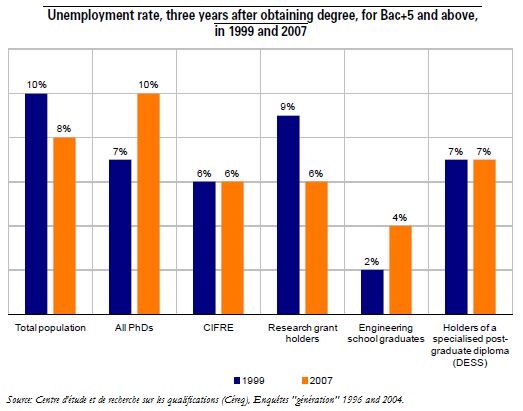Trésor-Economics No. 94 - Do PhDs have difficulty finding work in corporate R&D?
Unemployment is high among people with doctorates in France, both in relation to other graduate categories and by comparison with PhDs in other countries. The rate varies widely from one subject area to another, however. The unemployment rate for people with university doctorates in mechanical, electronic, computer engineering and engineering sciences is low, being close to that for engineering school graduates (around 4%). The rate for young PhDs in chemistry, literature and the human sciences, on the other hand, is three times higher.
By comparison with holders of a "Bac+5" level of education (high school graduation plus five years of higher education, generally leading to a master's or equivalent degree), there are relatively few PhDs in private R&D, most being employed in the public sector. While this is not a French specificity and the same observation can be made in all developed countries, there are grounds for wondering whether companies may have a selection bias against PhDs in favour of engineering school graduates.
To test this hypothesis, we use an econometric model to compare the productivity of PhDs with that of other graduates in a private sector R&D unit. From this it emerges that the productivity of PhDs is comparable to that of engineering school graduates, and that, for a given level of seniority, they are not paid less. Consequently, there is no selection bias against PhDs. Given the competences available and the specific features of companies, no fewer PhDs are hired in private-sector R&D teams than would be economically optimal. However, the mismatch in the supply of doctoral training programmes could lead to under-utilization of human capital.
The econometric analysis clearly shows the importance of the role played by researchers holding a degree other than the Bac+5 or a PhD in the production of innovations. Young people's disaffection from scientific subjects and the French economy's growing need for researchers is all the more cause for concern. All science training courses, including even the shortest ones, need to be supported, and not just doctoral courses.
